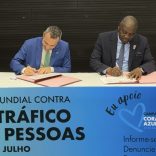Mozambique: Number of confirmed mpox cases rises to 17 - AIM report
Mozambique: State more concerned with LNG project than Cabo Delgado locals – church | Lusa

The Episcopal Commission for Justice and Peace, an entity of the Catholic Church in Mozambique, has accused the government of being more concerned with protecting natural gas projects in Cabo Delgado to the detriment of the local population, in a statement consulted by Lusa.
“The greater focus on defending the gas and oil business to the detriment of defending the lives of thousands of Mozambicans leads us to believe that the State’s primacy is to defend profits and welfare for a small handful of already wealthy people,” the commission said, in a statement signed by its president and Bishop of Nacala, Alberto Vera Arejula.
The first fight would be to put an end to the armed conflict, invest in the social area and infrastructures, as well as define strategies for an effective and safe exploitation of resources, the entity argued.
“Without life in a region and without local human resources it is impossible and absurd to catapult development,” the text reads, in a reference to the need to protect the communities of Cabo Delgado province, in the north of the country.
The Episcopal Justice and Peace Commission (CEM) pointed to “interests that have taken over the nation and its resources” as responsible for the armed violence in Cabo Delgado province.
For the Mozambican Catholic Church, there is a logical link between an alienated youth and the different forms of insurgency in Cabo Delgado, including criminality, terrorism, political and religious extremism.
“How can young people have perspectives, if the country itself seems to have no direction, no common project, in which they are invited to be active collaborators and which nourishes their hope?”
The marginalisation of young people favours the recruitment of armed groups operating in Cabo Delgado: “It is easy to entice people, full of life and dreams, but without prospects and who feel unjustified, victims of a culture of corruption, to adhere to the proposal of a new social order imposed by violence”, said the bishop of Chimoio and spokesman for CEM, Joao Carlos, on 16 April, after a meeting of Catholic bishops in Maputo.
Now, CEM has stressed that the Mozambican state does not have the conditions to face the war with the military forces at its disposal, warning that “military victory would not be an answer to the complexity of the situation in Cabo Delgado.
On the African continent there have been few successful cases of the military route, with foreign involvement, in the fight against extremism, if the social and economic dimensions behind the dissatisfaction of the communities were not tackled.
The commission noted that the victims of violence in Cabo Delgado feel abandoned by the Government and are living a humanitarian drama that requires a general mobilisation.
“It no longer makes sense to stop and do nothing, as we are all implicated. We need to explore and understand the contours of the humanitarian crisis we are witnessing today in Cabo Delgado and save whatever can still be saved”.
The Catholic Church needs to welcome and care for the lives of displaced people who have lost everything due to the destruction caused by armed violence.












Leave a Reply
Be the First to Comment!
You must be logged in to post a comment.
You must be logged in to post a comment.